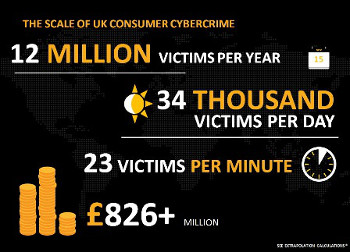“Auto-pilot posting” puts consumers’ privacy and security at risk.
 UK cybercrimeSymantec has released findings from the 2013 Norton Report, an annual global survey that examines consumer online behaviour and the real-world implications of cybercrime.
UK cybercrimeSymantec has released findings from the 2013 Norton Report, an annual global survey that examines consumer online behaviour and the real-world implications of cybercrime.
“Today’s cybercriminals are using more sophisticated attacks, such as ransomware and spear-phishing,” said Sian John, security strategist at Symantec. “With the findings from the Norton Report that 49% of global consumers use their personal mobile device for both work and play; this creates entirely new security risks for enterprises as cybercriminals have the potential to access even more valuable information.”
Despite a spate of embarrassing social media blunders making headlines this year, the UK findings show one-third (32 percent) of working adults using their mobile device in this way. Because one in five accesses their social network on their work phone, Symantec has warned that hasty social media updates and snaps, dubbed “auto-pilot posting,” are putting personal and professional privacy at risk.
John explains, “Whether we’re at home or in the office, it’s become second nature to pop a quick update or picture on our social profiles. The information we share can be completely harmless, but the danger lies in the fact that the action has become automatic. When we’re on auto-pilot, it takes mere seconds to post something online. Yet with so many different accounts on one device, public and private, it’s easy to address the wrong person and run into trouble.”
The report also found that while nearly half of all smartphone users care enough about their devices to sleep with them, they are not protecting them. Forty-eight percent of smartphone and tablet users do not take even the basic precautions such as using passwords, having security software or backing up files from their mobile devices. This carelessness places them, and their digital identities, at risk.
“If this was a test, mobile consumers would be failing,” said Marian Merritt, Internet Safety Advocate, Symantec. “While consumers are protecting their computers, there is a general lack of awareness to safeguard their smartphones and tablets. It’s as if they have alarm systems for their homes, but they’re leaving their cars unlocked with the windows wide open.”
Other Notable Findings for the UK
- The cost of cybercrime in the UK has fallen year-on-year (£826 million, down from £1.8 billion in 2012)]
- The average cost per victim has decreased from £144 in 2012, to £101 in 2013
- Nearly half of social network users (48 percent) do not log out after each session
- 32 percent share their profile passwords with others
- 31 percent of those surveyed admitted that the convenience of being constantly connected outweighed any potential security risks
“Globally, the cost per victim is up,” comments John, “but in the UK the cost is down quite significantly. This is due to cybercriminals shifting tactics, perhaps as Brits become more aware of scams. Criminals also use tactics where there is a lower cost per head to victims, as they believe scams like this have a higher chance of escaping notice, and as the number of victims has remained static, they are clearly still making money from online fraud.”
For more findings from the 2013 Norton Report globally and by country, please visit this link. For more information on Norton mobile protection offerings, please go here.
About the Norton Report
The Norton Report (formerly the Norton Cybercrime Report) is one of the world’s largest consumer cybercrime studies, based on self-reported experiences of more than 13,000 adults across 24 countries, aimed at understanding how cybercrime affects consumers, and how the adoption and evolution of new technologies impacts consumers’ security.
Follow us on Twitter - @DigiPrintNews
Like us on Facebook www.facebook.com/DPNLive - (click the ‘LIKED’ button/top of page as well)